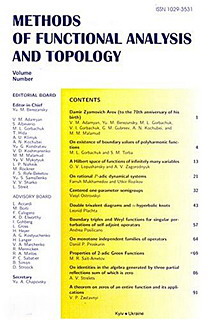Vol. 28 (2022), no. 4
On integral equations of Fredholm type for a class of bounded functions on the real line
Mammad Bayramoglu, Ilgar Jabbarov, Sabina Ibrahimova
MFAT 28 (2022), no. 4, 289-294
289-294
We consider the problem of extending the notion of a Fredholm integral
equation and investigate its solvability in the class of bounded functions on the real
line.
Розглядається задача розширення поняття iнтегрального рiвняння Фредгольма
i дослiджено його розв’язнiсть у класi обмежених функцiй на дiйснiй прямiй.
Linear differential equations of higher orders in a Banach space and the Vandermonde operator
MFAT 28 (2022), no. 4, 295-301
295-301
We study the question of existence of a unique bounded solution to
a Cauchy problem for a higher-order differential equation with bounded operator
coefficients. The case under consideration is where the corresponding “algebraic”
operator equation has separated pairwise commuting roots. Using the Vandermonde
operator constructed from such roots, representations for a unique bounded solution
and the Cauchy problem are obtained.
Вивчається питання iснування єдиного обмеженого рохв’язку задачi Кошi для
диференцiального рiвняння вищого порядку з обмеженим оператором коефiцiєнтами.
Розглядається випадок, в якому вiдповiдне “алгебраїчне” операторне рiвняння має
вiдокремленi попарно коммутуючi коренi. Використовуючи оператор Вандермонда,
який побудований за такими коренями, отримано представлення для єдиного
обмеженого розв’язку задачi Кошi.
Real algebraic functions on closed manifolds whose Reeb graphs are given graphs
MFAT 28 (2022), no. 4, 302-308
302-308
In this paper, we construct a real-algebraic function on
some closed manifold whose Reeb (Kronrod-Reeb)
graph is a graph respecting some algebraic
domain: a graph for this is called a
Poincaré-Reeb graph.
The Reeb graph of a smooth function is defined as a
natural graph which is the quotient space of the
manifold of the domain under a natural equivalence
relation for some wide and nice class of smooth
functions. The vertex set is defined as the set of all
connected components containing some singular points of
the function: a singular point of a smooth function is a
point where the differential vanishes. Morse-Bott
functions give very specific cases. The relation is to
contract each connected component of each preimage to a
point.
Sharko has posed a natural and important problem: can we
construct a nice smooth function whose Reeb graph is a
given graph? Explicit answers have been given first by
Masumoto-Saeki in a generalized manner for closed
surfaces. After that various answers have been presented
by various researchers and most of them are essentially
for functions on closed surfaces and Morse functions
such that connected components of preimages that contain
no singular points are spheres. Recently the author has
also considered questions and answered them in the cases
where the preimages are general manifolds.
У статті побудовано дійсну алгебраїчну функцію
на деякому замкнутому многовиді, графом Реба
(Кронрода-Реба) для якого є граф, який зберігає
деяку алгебраїчну область: його графік
називається графіком Пуанкаре-Реба.
Граф Реба гладкої функції визначається як природний
граф, який є фактор\-простором многовида, що відповідає
області, відносно природньому відношенню еквівалентності
для деякого широкого класу гладких функцій. Множина
вершин визначається як множина всіх зв'язаних
компонентів, що містять деякі особливі точки функції:
особливою точкою гладкою функції є точка, в якій
диференціал дорінює нулю. Функції Морсе-Ботта є
конкретними випадками таких функцій. Відношення
еквівалентності полягає в тому, щоб звести кожен
зв'язаний компонент кожного прообразу до точки.
Шарко поставив природну і важливу проблему: чи можемо ми
побудувати хорошу гладку функцію, граф Реба якої є
заданим графом? Чіткі відповіді були дані спочатку
Масумото-Саекі в узагальненому вигляді для замкнутих
поверхонь. Після цього були дані відповіді різними
дослідниками, і більшість з них були для функцій на
замкнутих поверхнях і функцій Морса для випадку, коли
зв'язані компоненти прообразів, що не містять особливих
точок, є сферами. Нещодавно автор також розглянув і
відповів на ці питання в випадках, де прообрази є
загальними многовидами.
Regularized solutions for abstract Volterra equations
MFAT 28 (2022), no. 4, 309-323
309-323
The aim of this work is to introduce the domain and the
Favard spaces of order $\alpha$ where $\alpha\in]0,1]$ for
$k$-regularized resolvent family, extending some of the
well-known theorems for semigroup and resolvent
family. Furthermore, we show some relationship between the
Favard temporal spaces and the Favard frequential spaces
for scalar Volterra linear systems in Banach spaces,
extending some results in [8,3].
Метою цієї роботи є ввести область та простори
Фавара порядку $ \alpha$, де $ \alpha \in] 0,1] $ для $k $
--- регуляризованої сім'ї резольвент, та розширити деякі з
добре відомих теорем для напівгруп і сімей
резольвент. Крім того, ми показуємо деякий взаємозв'язок
між часовими просторами Фавара та просторовими просторами
Фавара для скалярних лінійних систем Вольтерра в банахових
просторах, розширюючи деякі результати в [8,3].
On a class of closed cocycles for algebras of non-formal, possibly unbounded, pseudodifferential operators
MFAT 28 (2022), no. 4, 324-332
324-332
In this article, we consider algebras $\mathcal{A}$ of
non-formal pseudodifferential operators over $S^1$ which
contain $C^\infty(S^1),$ understood as multiplication
operators. We apply a construction of Chern-Weil type
forms in order to get $2k-$closed cocycles. For $k=1,$ we
obtain a cocycle on the algebra of (maybe non classical)
pseudodifferential operators with the same cohomology
class as the Schwinger cocycle on the algebra of classical
pseudodifferential operators, previously extended and
studied by the author on algebras of the same
type.
У цій статті ми розглядаємо алгебри
$\mathcal {A}$ неформальних псевдодиференціальних
операторів над $ S^1$, які містять $C ^ \infty (S ^ 1) $ і
розглядаються як оператори множення. Застосовується
конструкцію форм типу Черна-Вейля, для отримання
$ 2k$-замкне\-них коциклів. Для $ k = 1 $, ми отримуємо
коцикл на алгебрі псевдодиференційних операторів (можливо,
некласичній) з тим самим класом когомологій, що і коцикл
Швінгера на алгебрі класичних псевдодиференціальних
операторів, який був раніше розширений і вивчений автором
на алгебрах того ж самого типу.


